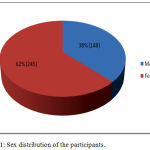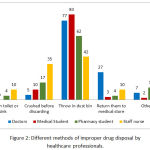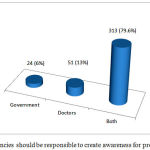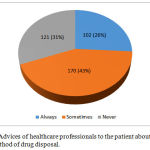Sangeetha Raja, Satyajit Mohapatra , A. Kalaiselvi and R. Jamuna Rani
, A. Kalaiselvi and R. Jamuna Rani
Department of Pharmacology SRM Medical College Hospital and Research Centre Potheri Tamil Nadu, India.
Corresponding Author E-mail: satyajitmp@gmail.com
DOI : https://dx.doi.org/10.13005/bpj/1585
Abstract
Medicines play a very significant role for treating many diseases and conditions, but at the end of the treatment it is very important to dispose them of properly. So, the knowledge and awareness of proper drug disposal are essential for safe environment. Lack of knowledge and practice can lead to various problems like environmental pollution and various health hazards directly or indirectly. Hence, the study was aimed to assess the knowledge, practice, and awareness towards disposal of unused / expired drugs among healthcare professionals such as doctor, medical students, pharmacy students and nurses. This was a cross-sectional questionnaire-based study conducted in a tertiary care teaching hospital. About 400 participants in each category were included in the study. The questionnaire consisted of three parts which included demography, and multiple choice questions related to knowledge and awareness of the drug disposal. The collected data was expressed in percentage. A total of 393 participants have completed the survey which includes 32% males and 68% females. It was found that the commonest discarding pattern of the expired/ unused medicines was through household trash (67%). A total of 349 (89%) were aware of the significance of improper disposal. It was observed that the participants 44(11.1%) had partial knowledge about proper drug disposal but there was a lack of practice 264 (67.1%) of safe disposal methods. This study aimed to create an awareness to bridge the lacunae between knowledge, practice of proper and environmental safe methods of disposing expired/ unused drugs among health care professionals.
Keywords
Cross Sectional Study; Drug Disposal; Expired Medicines; Unused Medicines
Download this article as:| Copy the following to cite this article: Raja S, Mohapatra S, Kalaiselvi A, Rani R. J. Awareness and Disposal Practices of Unused and Expired Medication Among Health Care Professionals and Students in A Tertiary Care Teaching Hospital. Biomed Pharmacol J 2018;11(4). |
| Copy the following to cite this URL: Raja S, Mohapatra S, Kalaiselvi A, Rani R. J. Awareness and Disposal Practices of Unused and Expired Medication Among Health Care Professionals and Students in A Tertiary Care Teaching Hospital. Biomed Pharmacol J 2018;11(4). Available from: http://biomedpharmajournal.org/?p=24309 |
Introduction
Global Medicine consumption is increasing day by day especially in counties like India and China.1 More emphasis is made on the rational use of medicine such that patients should receive the right medicines at the right time and use them appropriately.2 Most of the times these prescribed medicines are left unused due to various reasons like the change of treatment, side effects of the drug, improvement of patient condition resulting in discontinuation of the course of treatment. Re-use of leftover drugs for self-medication is unsafe which should be used only under the supervision of medical professional especially antibiotics and other prescription drugs.3 In addition, storage of unused medicine at home may increase the risk of a wide range of potential drug-related problems like errors in taking medications, adverse drug reactions, and can be considered as a waste of resources.4 Eventually these medicines are disposed off but there is a lacunae in proper disposal practices.3,4
Improper disposal of medicines can cause an environmental contamination which leads to health hazards.5 Currently, a high amount of pharmaceutical wastes flows through sewerage into the water bodies alarming the environmental scientist around the world and are also getting absorbed into the land when they are disposed of as solid waste in landfills. Worldwide the use of pharmaceuticals is increasing with time6 and newly identified pollutants may come as a threat to the environment in the future.7 According to the World Health Organization (WHO), the majority of medication was inappropriately prescribed and sold, which leads to unnecessary storage and creates environmental threat during improper disposal.1,2 It was established that tons of municipal solid waste are generated due to expired and unused drugs.8 These are due to the improper disposal of unused medications through environmentally-unfriendly routes.9 To overcome this problem the proper handling of the expired drugs is imperative. Moreover the improper drug disposal causes various consequences like accidental consumption of expired drugs, resale or misuse during sorting. 10 The common preventive step to protect the environment from this kind of pharmaceutical waste is by creating the awareness about proper disposal method to avoid the pollution of environment and their impacts. Although the National Formulary of India, specifies guidelines for the proper disposal of medicines, yet most of the people are not aware of these guidelines and the importance to follow them.11 As this is an emerging issue of concern, the present study was planned to carry out. Most of the healthcare professional was not aware of proper drug disposal and their impacts. Taken together, this study was planned to introduce healthcare professionals to assess their knowledge, practice and awareness towards safe disposal of expired drugs. Hence, we sought to conduct the study to find out the knowledge, general practices, awareness, concerning the correct disposal of unused and expired drugs among healthcare professionals in tertiary care teaching hospital in South India.
Methods
This was a cross-sectional, questionnaire-based study which included the participants like doctors, medical students, staff nurses and pharmacy students in SRM Medical College Hospital & Research Centre Chennai, Tamil Nadu. The study was approved by the Institutional Ethics committee. According to our sample size, 100 participants from each category were selected. Before filling out the questionnaire, the importance and purpose of the study were explained to the study participants. After obtaining the informed consent, the semi structured questionnaires were distributed to them and sufficient time was given to the participant to fill out the questionnaire.
The questionnaire comprised of three parts, in which part I includes demographic details of the study participants such as participant, gender, age, department, and designation. Part II comprises of questions regarding the knowledge of unused and expired drugs. In Part III, the questions were related to the awareness and practices of unused and expired drug disposal. Completely filled questionnaires were taken for data analysis. The data were represented as percentage and analyzed through Microsoft Excel, 2013.
Result
A total of 393 healthcare professionals completed the questionnaire. Among the participants 148 (38%) were male and 245 (62%) were females (Figure 1).
 |
Figure 1: Sex distribution of the participants.
|
In this study, nearly 217 (55%) of the participants have preferred procuring medication through prescription. Almost 98 (98%) of the nurses checked the expiry date of the drug always but 81 (85%) of them considered it as unsafe to take expired medication because they are toxic. Whereas, 93 % of doctors responded that the effect of the drug remains same/ loses its effect beyond its expiry date. Among the student population (Pharmacy & Medicine), only 22 (6%) did not look for the expiry date in which 60% of them considered that the drug is toxic after expiry date.
About 55.4% of the participants had unused medicines at home among which the nurses had the lowest (6.8%). The reasons of having unused medicines at home are like medical conditions/ resolved 140(36%), excess quantity supplied 82 (22%) followed by change to another treatment 65 (18%)as shown in Table 1. About 38.16% of these medications were stocked up in case if needed later. Among them, about 110 (27.9%) participants don’t keep them at home and among them majority were nurses 41(10.4%)(Figure 2).About 264(17%) participants mentioned that by throwing in thrash is the major route of drug disposal followed by crushing the drugs before discarding (17%), flushing in toilets or sinks (6%) and only 5% return the drugs to the medical store ( Figure 2).
Table 1: The reason for leftover unused medications at home.
| Sl. No | Healthcare Professional | Change to another treatment | Excess quantity supplied | Inconvenience/ difficulty following instructions | Medicine label had unclear instruction | Medical condition improved or resolved | Side effects of medications |
| 1 | Doctors | 20 (21.5%) | 20(21.5%) | 2(2.1%) | 4(4.3%) | 46(49.4%) | 1(1.0%) |
| 2 | Medical Student | 25(25.7%) | 32(32.9%) | 7(7.2%) | 2(2.0%) | 29(29.8%) | 2(2.0%) |
| 3 | Pharmacy Student | 20 (20.8%) | 15(15.6%) | 10 (10.4%) | 2 (2.0%) | 39(40.6%) | 10(10.4%) |
| 4 | Pharmacy Student | 10(10.1%) | 15(15.1%) | 18(18.1%) | 11(11.1%) | 26(26.2%) | 19(19.1%) |
 |
Figure 2: Different methods of improper drug disposal by healthcare professionals.
|
When evaluating the awareness about environmental hazards349 (89%) were aware of the significance of improper disposal, whereas 20 (5%) participants respondent, mainly students mentioned that improper disposal do not cause any harm. It was found that 304 (77%) of the participants were not aware of the national drug take back programme existing in other countries. About 341(87 %) participants suggested implementing such programmes in India by creating awareness through Government programmes 24 (6%) and via healthcare professionals 51 (13%). Overall opinion was to combine both government and healthcare personals (79.6%) for creating awareness (Figure 3). The appropriate source of awareness to inform about proper disposal were internet/ social media104 (27%) (Table 2).
 |
Figure 3: Agencies should be responsible to create awareness for proper disposal.
|
Table 2: The best source to create awareness for society.
| Sl. No | Healthcare Professional | Newspaper | Electronic media | Internet/ Social media | Pharmacist | Physician | All of the above |
| 1 | Doctors | 10(10.6%) | 15(15.6% | 10(10.6%) | 0 | 12(12.5%) | 47(98.9%) |
| 2 | Medical Student | 12(12.1%) | 14(14.1%) | 30(30.3%) | 15(15.1%) | 22(22.2%) | 06(6.0%) |
| 3 | Pharmacy Student | 08(8.4%) | 13(13.6%) | 34(35.7%) | 24(25.2) | 08(8.4%) | 08(8.4%) |
| 4 | Pharmacy Student | 10(10.4%) | 20(20.8%) | 30(31.2%) | 10(10.4%) | 23(23.9%) | 03(3.1%) |
It was noted that about 102 (26%) respondent always advised for proper drug disposal, 170 (43%) advised occasionally and 121 (31%) never advised to anyone (Figure 4). About 160 (42%) participants considered a proper guidance to the consumer can minimize the hazardous effect of unused/expired medicines (Table 3).
 |
Figure 4: Advices of healthcare professionals to the patient about proper method of drug disposal.
|
Table 3: The hazardous effect of unused and expired medicines minimized or controlled.
| Sl. No | Healthcare professionals | Lowering the No. of prescribed medicine by doctors | By donating the unused medicines | By providing proper guidance to the consumer | By prescribing in quantities and for duration that ensure |
| 1 | Doctors | 13(13.6%) | 7(7.2%) | 47(48.9%) | 27(28.1%) |
| 2 | Medical Student | 7(7.0%) | 22(22.2%) | 35(35.3%) | 35(35.3%) |
| 3 | Pharmacy Student | 18(18.5%) | 10(10.3%) | 30(30.9$) | 39 (40.2%) |
| 4 | Staff Nurse | 22(22.2%) | 14(14.1%) | 48(48.4%) | 15(15.1%) |
Discussion
In our study, most of the participants prefer to procure drug via prescription and almost all nurses checked the expiry date before using the drugs. This is because they are the one who dispense the medicines to the patients. The nurses are a good source to educateand emphasizes the importance of expiry date to the patients. We observed that the awareness to check the expiry date among the participants were 92.8% when compared to 78% of awareness in a similar study.12 Expired medical products may be harmful to health. The U.S. Food & Drug Administration (FDA) mandated specifying expiration dates on all medicines in the late 1970s. The expiration date of a drug is predictable using stability testing under good manufacturing practices. Marketed drug products should have an expiration date that extends from a minimum of one year to a maximum of five years from the time of manufacturing .13 Most of the staff nurses 85 %, medical and pharmacy students (65%, 60%) respectively, are under the impression that the effects of the drugs are toxic beyond its expiration date. Wide-range of drugs is not toxic when expired, but indeed lose their effectiveness over time. The expiration date is the final date that the manufacturer guarantees the full potency and safety of a medication.14 Majority of the doctors in our study concurred with the above statement.
The most common method for disposal of unused medications practiced are throwing in dust bin, this practice of disposal are followed irrespective of various healthcare professional category be it a doctor, student or nurses. Not only in India but also in various countries of the world it is followed the same, majority of the population throw it in garbage in countries like UK and Saudi Arabia while New Zealand ,USA flushing in toilet predominates. Only in countries like Germany and Sweden they follow the practice of returning it to the pharmacy.15 Most of the students (72%) throw the expired medications in dustbins though it is comparatively less than the other study (94%)16, still better awareness in these category will help in a long term goal. The most common reason for keeping unused medicines was “in case they are needed later” 38.16% of doctors and Healthcare Professional (HCP) students, interestingly most of the nurses replied that they don’t keep them and discards the drugs but the method of disposal is still questionable. The common reason concurred with the previous study in which 68% kept the drug for future needs.17
Majority of the participants in all categories knew about the hazards to the environment due to improper drug disposal. It was recommended in the FDA guidelines for drug disposal that unused/expired medicines should not be flushed in toilet or drain. Before throwing the unused /expired medicines in the dustbin it was suggested to mix the solid medications with the substance like coffee grounds and put into a disposable container and the liquid medications with salt, turmeric. Inappropriate medication disposal were associated with accidental exposure to human, livestock and aquatic organisms. USFDA have initiated the drug take back programme on 25thSeptember 2010, for preventing and controlling these problems.18 Pharmacies interested in program would be identified wherein patients visiting these pharmacies would be encouraged to return the unused/expired medications to the pharmacy.
The disposal of unused / expired medications from the pharmaceutical industries are given to Bio Medical Waste Management and disposed as per the rules (Biomedical waste Management).19 However, no provisions for disposal of drugs from each home and lack of awareness regarding safe disposal. So a proper awareness programme is the need of the hour to tackle the issues arising from improper drug disposal.
Conclusion
According to this study, majority of the participants were practicing in appropriate methods of disposing the drugs though they were aware of the consequences to the environment, the lack of proper guidance for safe disposal renders them vulnerable for such practices. To minimize improper drug disposal, Government should implement a national level drug take back programme preferably collecting the returned unused or expired drugs at every level of Government hospitals. Awareness programme should be conducted periodically to all the healthcare professionals to practice as well as advice and motivate the general public on safe drug disposal. Media like television, social networks should be used to propagate the challenges to the environment due to improper disposal drugs of the disposal.
Acknowledgements
Author extended her sincere thanks to the Dean, SRMMCH&RC Chennai, for his support and also authors would like to acknowledge the Dean, SRM college of Pharmacy for providing permission to collect data. We are grateful to all respondents for their well cooperation during this survey.
References
- World Health Organization, The world medicines situation 2011‐Rational use of medicines. (WHO/EMP/MIE/2011.2.2). 3rd Edition. Geneva:WHO. 2011.
- World Health Organization,The pursuit of responsible use of medicines sharing and learning from country experiences. World Health Organization. http://www.who.int/iris/handle/10665/75828. 2012.
- Gitawati R. Pattern of household drug storage. Kesmas. Jurnal. Kesehatan.Masyarakat. Nasional. 2014;9(1):27-31.
CrossRef - Kheir N., El Hajj M. S., Wilbur K., Kaissi R. M., Yousif A. An exploratory study on medications in Qatar homes. Drug Healthc Patient Saf. 2011;3:99-106.
CrossRef - Medhi B.,Sewal R. K. Ecopharmacovigilance. An issue urgently to be addressed. Indian. 2012;44:547‑549.
- Jonathan D & Rockoff. Prescription Drug Scale Rise 5.1% April 2. (The Wall Street Journal). 2010.
- Daughton C. G. Pharmaceuticals in the environment: sources and their management. In: Petrovic M, Barcelo D, editors. Analysis, fate and removal of pharmaceuticals in the water cycle.Elsevier Science. 2007;1-58.
- Rehan A.,Noman A. Case Study Report, healthcare waste management in Karachi, PAKISTAN. 2008.
- Swaroop H. S., Charaborty A., Virupakshaiah A. Knowledge, attitude and practice of medical professionals towards the safe disposal of unused medications in South India. World J. Pharm. Pharm Sci. 2015;4:1423‑14.
- Aditya S. Safe medication disposal: Need to sensitize undergraduate students. Int J Pharm Life Sci. 2013;4(3):2475-80.
- National Formulary of India. Disposal of Unused/Expired Pharmaceutical Products(Appendix IV). 4th ed. New Delhi: Indian pharmacopoeia commission. 2011.
- Umamageshwari A., Scindia M. V. G., Vivekkumar S. P., Geetha R. Assessment of knowledge and practice toward disposal of expired drugs among medical professionals in chennai – a cross-sectional prospective study. Asian J Pharm Clin Res. 2017;10(12):324-327.
CrossRef - PremSwaroop A & Varun D. A glimpse on expiry date of pharmaceutical dosage forms. An International Journal of Advances In Pharmaceutical Sciences. 2001;2(5-6):423-433.
- Basha C., Babu K. R., Madhu M., Kumar Y. P , Gopinath C. Recycling of drugs from expired drug products: Comprehensive review. Journal of Global Trends in Pharmaceutical Sciences. 2015;6(2):2596– 2599.
- PautKusturica M., Tomas A.,Sabo A. Disposal of Unused Drugs: Knowledge and Behavior Among People Around the World.Rev Environ. Contam.Toxicol. 2017;240:71-104.
- Aditya S. Safe medication disposal: Need to sensitize undergraduate students. J of Pharm & Life Sci. (IJPLS). 2013;4(3):2475-2480.
- Vellinga A., Cormican S., Driscoll J., Furey M., O’Sullivan M., Cormican M . Public practice regarding disposal of unused medicines in Ireland. Sci Total Environ. 2014;15(478):98-102.
CrossRef - US Food and Drug Administration. For consumers: how to dispose of unused medicines. Available at: The Bio-Medical Waste Management (Amendment) Rules. 2018.








